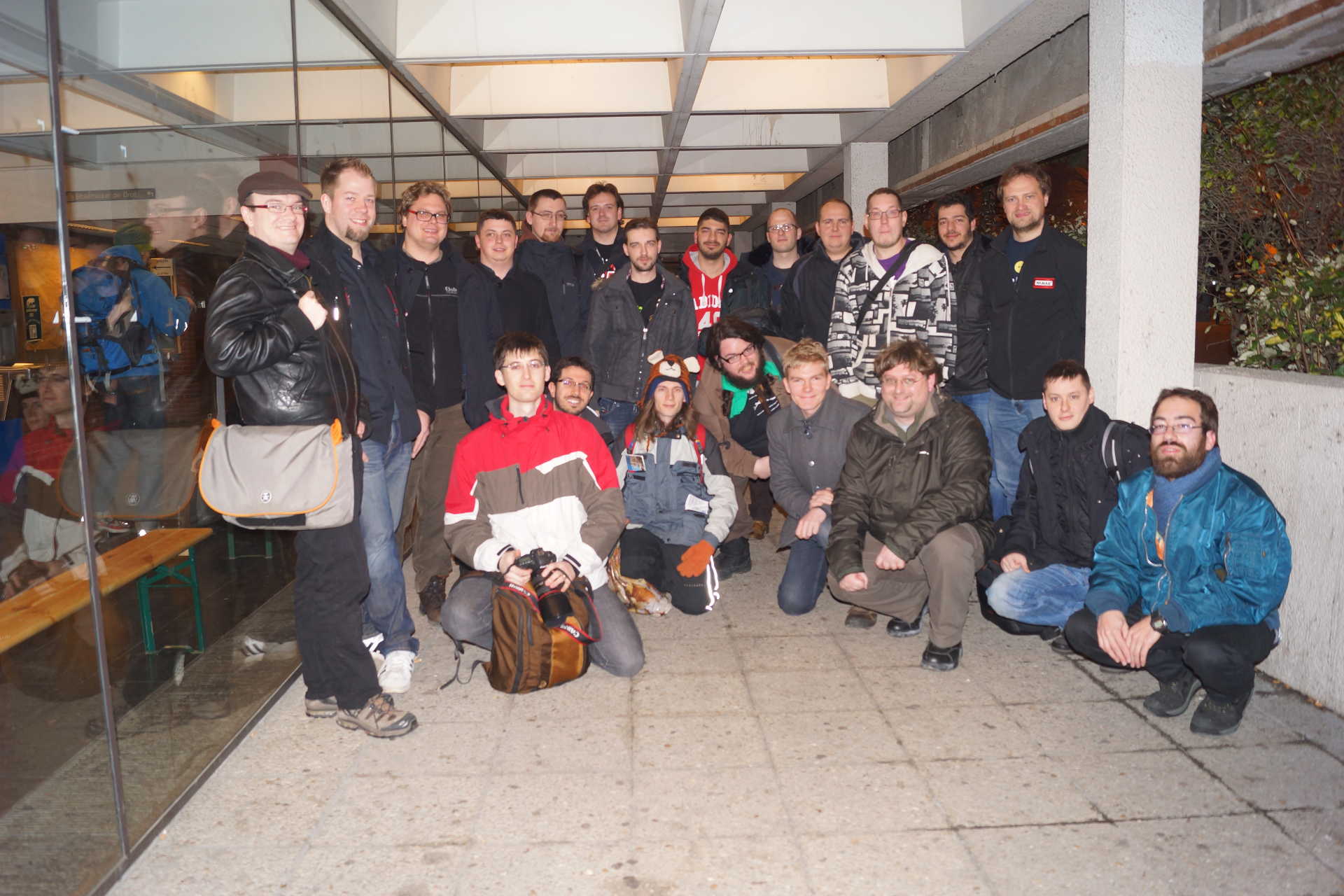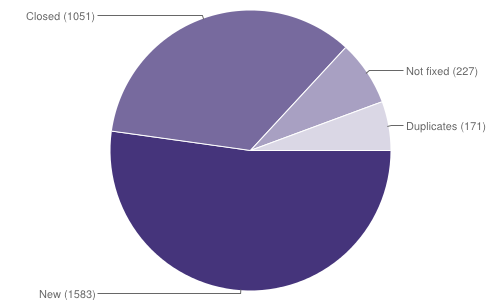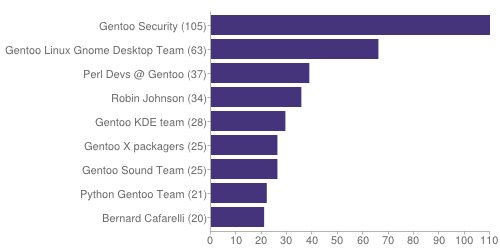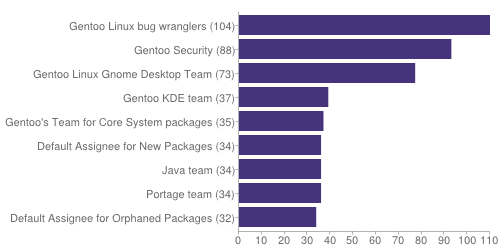This month in GMN:
Gentoo news
Interview with Gentoo developer Sven Vermeulen (swift)
(by David Abbott)
1. Hi Sven, tell us about yourself?
My name is Sven Vermeulen. Although Sven is a primarily Scandinavian name, I have no roots with Scandinavia. I’m born (and still living) in Belgium, growing up with geeky domains such as technology, math, science and computing. In 2005 I graduated as engineer and started working for KBC, one of Belgium’s leading financial institutions (bank & insurance). In it, I always kept technology close to me, first as system engineer and now as IT architect.
My interest in technology & science never faded. Although computer systems and software development are my primary hobbies (as they can be handled hands-on easily without heavy investments) I still like to learn about the progress made in other fields and give myself exercises to keep my knowledge on those fields up to date. And for some reason, that always tends to help me with my real-life work (for instance for contract optimizations I used mathematical optimization methods).
I live with my daughter close to my work (between Brussels and Antwerp) which allows me to go to work by bicycle if my presence isn’t needed elsewhere. My work does require me to go abroad from time to time, but mostly within the European Union.
In my free time I enjoy … wait, free time? Nope, don’t have that nowadays. Let me rephrase it: if I had more free time, I’d probably spend it jogging or swimming (which I currently only do to clear my mind), sitting behind my computer (programming, documenting or just playing around), watching cats do stupid things on my tv (youtube – I don’t have cable or other TV services) and playing board games with friends.
Alas, most time is spent either on work, on working in my home (renovations) or providing taxi services to my daughter.
2. How did you get involved with Linux and Open Source?
That started in ‘96 or ‘97. I got a RedHat installation to play with and thought I could become a kernel developer with it. Well, I did have lots of imagination back then 😉 But I did enjoy the difference from the previous operating systems I used (Atari and Microsoft DOS/Windows) and was quite hooked by the idea of free software (I think then it was still mostly coined as “open source”).
I never deployed anything commercial / proprietary on my own systems anymore since. The BBS’es (and later Internet) provided all the information I needed to continue with free software. And as a C programmer (not saying I’m good at it, just saying I program in it) I took on the challenge of supporting my (then unsupported) Matrox graphics card with dual output in Linux. I got good help by the Linux development community, and got in touch with Linux’ internal structures. Which I immediately embraced as a new source of knowledge, as I moved to software engineering in my studies.
All software related things I did were in the free software world, patching here and there. After a while, I stumbled upon the next challenge, which was convincing other users to use free software. A major gap in this area was documentation, so I started learning about writing good documentation (I’m still disappointed that the Darwin Information Typing Architecture (DITA) hasn’t broken through), which is about the point that I joined Gentoo Linux.
In Gentoo, I first helped with translations, then moving on to English documentation, authoring, etc. Internally, I’ve been through various roles (regular developer, project manager, top-level project lead, trustee, council) in various areas (most of them non-technical, such as documentation, PR, recruitment). After quitting and joining a few times (I seem to have ups and downs in available time) I’m now running to keep the Gentoo documentation maintained, as well as supporting SELinux through the Gentoo Hardened project.
I often bounce from one technology or software to another, depending on the needs of the day. Need to detect installed libraries (in order to track potential vulnerabilities) but can’t find a tool? I’ll write one. Want to confirm secure configurations? I’ll learn about SCAP technologies and implement that. Require a web-based question & answer application? Let’s look how HTML5 works shall we. I’m pretty fluent in learning about technologies, protocols and what not.
Almost wished I was equally fluent in languages and history, which was my major obstacle at school…
3. I read your book Linux Sea and not only was impressed, really enjoyed it. Doing a Gentoo Linux install using the book as a classroom textbook would be the kind of class I would love to take. How did the book come about, and why Gentoo?
I wanted to create a documentation resource on Linux, discussing how Linux operating systems work (the concepts and architecture, but without diving into the details and advanced usage) and to which I can refer people who have a need for understanding a particular aspect of the operating system.
As a target distribution, I choose Gentoo because there aren’t many resource on Gentoo, and because Gentoo sticks close to the implementations of the projects themselves. There are no interfaces or APIs surrounding any of the functionalities that a Linux operating system provides, so I can easily discuss the real implementations. Not completely a “Linux from scratch”, but sufficiently close.
Another advantage of using Gentoo as example distribution is that readers, who use different distributions, can still enjoy the book (as it explains how things work) and then refer to the distribution-specific information of their distribution to go further, now with the knowledge of how things work “under the hood”.
4. With your skillset you would be welcome in any project, why do you support Gentoo?
I switch between many interest fields, and Gentoo is one of the few distributions that caters for it. If you need a responsive desktop, Gentoo can offer that. You want good support for many graphical environments? Gentoo can offer that. Need to implement a secure server: yes, Gentoo can offer that. Want to run Gentoo on a very small, lightweight device? Gentoo can offer that. Want to create a Linux router? Of course Gentoo can offer that.
If I want to do something similar with another distribution, I would most likely need to use a different set of distributions depending on my needs.
A second reason is the flexibility offered by Gentoo. Many tools offered by Gentoo are meant to assist in the maintenance and use of one or more tools or services, but without limiting the configuration abilities of the underlying components. Take portage for instance: you can hook into the various phases of package deployment easily, and many ebuilds support epatch_user, allowing for customizing deployments without removing functionality offered by Gentoo.
Or OpenRC’s dependency-based service scripts. Instead of naming it with a number depending on when you want to launch it, just put in the necessary dependencies in the scripts and you’re all set. That’s not just easy. That’s what makes Gentoo unique and powerful.
5. What could we be doing better?
I think we should be focusing more on (functional) areas than package sets (herds), and looking for ways to innovate in those areas. Right now, we’re happily following along with (most) upstream projects, and doing our job as a distribution that upstreams patches and supports users.
But why not look for more innovative ideas? Be open and bold with ideas, discuss them publicly (now that we have the Gentoo wiki, this should be easy to implement), create concept code and documentation. Do things other distributions can’t.
We should dare to fail, in order to learn. Right now, it seems that we’re sometimes afraid of making the wrong choice. We’re an organization with several hundred developers and volunteers, but not bound by service agreements, contractual obligations or implied functional adherence based on financial contributions. We should leverage that and move towards more innovative fields.
A second item that I believe would improve Gentoo as a distribution would be to remove complexity. Often, we do things in a somewhat complex way because there is no other way. That’s fine. But after a while, new and simpler methods come by that should replace the functionality we implemented more simplified.
Think about how the Gentoo Handbook is currently developed. We used our own format / syntax for reasons that were, back then, correct reasons. But things move on and mature. And while there are now much better alternatives available, we can’t use it because we customized everything to our needs. Writing documentation in the Gentoo Handbook almost requires you to learn how to program, as we use keywords, conditionals, include directives, automatic link generation, string substitutions and more. This is complex, and we should focus on simplifying this.
*I* should focus on simplifying this.
I’m pretty sure other examples can be found. Are all our eclasses still fully needed? How come the ruby-ng eclass is quite different from python-r1 eclass, even though they generally want to offer the same functionality? TIMTOWTDI, but if there is a method better and more simple than the other, use it.
6. Describe to our readers the relationship between the council and the foundation?
Basically speaking, the council is for technical matters and organization with regards to the Gentoo project, whereas the foundation is for the legal and financial aspects to support the Gentoo project. The two work orthogonal to each other (I am not aware of any overlap).
7. Is this relationship working, does it need to be changed or improved?
I think this is working pretty well and see little room for changes.
8. Same question for improving our partnership with Förderverein Gentoo e.V.
The Förderverein Gentoo e.V. and Gentoo Foundation, Inc. are sort-of siblings. After the decommissioning of Gentoo Technologies, Inc. each organization took on the responsibility of protecting the Gentoo trademark and supporting the Gentoo project in their home base: Förderverein Gentoo e.V. in Germany/Europe, and Gentoo Foundation in the United States of America.
9. What about moving the Gentoo Foundation to Belgium or somewhere in Europe?
I don’t think (re)locating a company to a specific location helps if there isn’t a need to. We should focus on what matters: protection and support of the Gentoo project and its intellectual property, and then evolve towards a structure that can easily support this now and in the future.
10. What documentation is moving to the wiki?
Well, right now we want to have all GuideXML documentation (which is non-handbook formats) on the Gentoo wiki. Most of the GDP-maintained documents (those in /doc/en) have been moved already, and moved into the main name space of the wiki so that others can contribute to it. That is also one of the main motivations for the move, as the Gentoo Documentation Project, for now, has insufficient resources to maintain GDP-only documentation.
In the next phase, handbook format documents (such as the SELinux Handbook, Gentoo Security Handbook and eventually the Gentoo Handbook itself) can be moved to the wiki as well. For the Gentoo Handbook though, this is more than just a copy of the data – it will require a refactoring of the documentation into a way that we can structure. I know the wiki supports inclusions and even conditionals, but this is some complexity I want to remove from the handbook.
A second thing a3li and I will look into (when time comes) is the ability to actually generate booklets from the wiki (like wikibooks.org does). I think this is a logical consequence, as those plugins (as used by wikibooks) are made with larger documents in mind, and allow us to align the documentation development with those best practices as gently suggested by the plugins.
But to do so, I believe that the architecture-specifics will need to be cleaned out. Either an entire chapter can be written independently of an architecture, or it can’t. Having a chapter that is “mostly” for one architecture, but with parameters and variables for each architecture just to make sure it reads fine for that architecture, is probably not doable or maintainable.
I have considered moving the larger documents in DocBook format (which is the format I use for my other, non-Gentoo documents), and that is still not abandoned. I guess I’ll need to sleep over it some more.
But first make sure that our wiki is qualitatively up to the standards we once had for our documentation.
11. With the documentation moving to the wiki have you noticed more contributions from the community?
The main advantage is that there are new documents being created of good quality, which upon discovery I also mark for translations (so that our translation teams can provide the same documentation to non-English readers) and perhaps even add metadata to it (so that it is taken up in the “featured documentation” overview). The Gentoo wiki is constantly growing, and is more and more becoming a standard source of information when trying to debug or troubleshoot issues reported on our support channels or forums.
Existing documentation, which is moved to the wiki, doesn’t get as much updates as I expected. But there are many reasons why, such as documentation being quite explicit, or people being afraid of editing documents written in a particular style they are not familiar with, or people just suggesting things in the discussion pages but not in the main page, …
12. What should we be doing to get more users involved?
One thing is to make it clear to users that the wiki is open for everybody, and that we welcome all additions. Even when the change is not within the expectations of the English language (style and grammar) as we have enough people watching over to fix these styles and who do this gladly, without any remark towards the original author. Not everyone is fluent in English, and we shouldn’t restrict contributions to language puritans as the broader community has a lot more knowledge ready to be shared.
A second thing is to try and get the discussions through the discussion pages more active. Right now, many discussions are still slow-paced. We should promote this more, but also make sure that we can follow up on these discussions easily. There are two ways to do this in a wiki. One is to watch the page (and the discussions), the second one is to mark the discussions as being “open”, so they can be aggregated and viewed through the proper category in the wiki.
13. Who would you like to see recruited to become Gentoo Developers?
I’d like to see more package maintainers. There is still plenty of software without ebuilds, and that is after all what our users expect us to do the most. Even if a developer only maintains a handful of packages, that shouldn’t be a criteria to grant or deny access to the repository.
With the (eventual) implementation of git repositories, we should also be able to work with the pull request methods allowing people who don’t want to become developer to still contribute to the portage tree.
But the most important is not what technical or non-technical abilities they have, or which role they want to take in the Gentoo project, but rather their willingness to perform and work on an operating system used by several thousand users.
14. What else can we utilize the wiki for?
When the wiki was first launched, I started using it as some sort of Knowledge Base [1]. It allows for specific issues or misconfigurations to be documented and assist users in troubleshooting them. I still think this is a worthwhile set of documents to pursue, but needs a lot more content. I hope to, one day, be able to just mine the knowledge from #gentoo (i.e. historical discussions and questions) and put those in the knowledge base.
[1] https://wiki.gentoo.org/wiki/Knowledge_Base
Perhaps we can, one day, use the wiki as some sort of reference architecture for Gentoo. Such a reference architecture would explain readers how Gentoo could be used to create an integrated environment, where each component has bindings with other components, in a well-orchestrated manner.
Right now, most documents focus on a single technology implementation and there is no full picture as to what Gentoo can really offer to organizations and companies of reasonable size.
15. What would you like the main site to be used for and what framework / language should we use for the redesign?
Personally, I think it would be a good idea to focus on a small main site, using a no-nonsense interface like Bootstrap, with support for mobile devices. Keep the amount of information that is dynamic of nature on other sites, like the Gentoo wiki (perhaps in a closed category so that only privileged developers can access it, for instance if it is about the social contract) and focus on telling the reader what Gentoo is and how to get it.
Underlying, this can even be made static HTML. That’s quite powerful, well known to most people, and doesn’t need any (potentially risky) modules on the web sites.
16. As a Gentoo Developer what are some of your accomplishments?
It’s difficult to put these in any order, as their accomplishment value depends on the time 😉 Still, it would be to assist in the Gentoo Handbook, the creation of the Gentoo Foundation, improved integration of SELinux in Gentoo, the Dutch translations (now they’re fully abandoned, but were once the top translation language), package maintenance here and there, support on #gentoo and the Gentoo Forums and what not.
17. What would be your dream job?
Honestly, I have no idea what it would be. However, it would not be as much about the content, but rather the energy that it would give me to go forward. A job with responsibility (but only on areas that you can influence – not the “You’re responsible for everything that goes wrong” kind of jobs), flexibility in hours, close to home, continuous education/improvement possibilities, lots of social contact (but not necessarily in team manner) and an innovative, evolving goal (not a day-in, day-out same kind of job).
18. What are the specs of your current boxes?
I have two laptops at home (a 2-year old i5 and a recent i7 laptop), a hacked Samsung TV, a hacked Ubiquiti router and two Synology DiskStations (which I oddly haven’t modified yet).
Next to the systems at home, I also manage two Dell PowerEdge servers which both host virtual systems for various personal purposes (such as attempts to move current cloud-driven solutions, such as Google mail and calendar) towards self-hosted solutions. These servers are co-located (luckily, because they make too much noise to be in my home).
19. Can you describe your personal desktop setup (WM/DE)?
I run XFCE with 7 xterms and two browsers open. I’m more a CLI guy 😉
My previous one was fluxbox, which I enjoyed much as well. However, I ran XFCE due to a bug that someone reported (in SELinux support) and I wanted to reproduce it. And for some reason, it stuck.
20. What gives you the most enjoyment within the Gentoo community?
The appreciation received when fixing someone’s situation or helping them get the most of their installation. Honestly, I think that’s the best thing one can receive. Not only because it gives you a warm and fuzzy feeling, but also because these users often start helping others as well. This is why #gentoo is one of the largest support channels out there.
Gentoo @ FOSDEM 2014
(by Pavlos Ratis)
On the 1st and 2nd of February, many Gentoo users and developers attended FOSDEM, the biggest F/OSS conference in Europe. Gentoo developer and council member Donnie Berkholz(dberkholz) had a talk about the status of distribution-level package management and the latest trends. Furthermore, a Gentoo BoF took place on Saturday. There, we had the chance to meet each other and talk about our favorite distro. The day ended with a Gentoo-ish dinner and beers at city’s center.
Council News
(by Andreas K. Huettel)
First of all, Robin Johnson’s (robbat2) GnuPG key policy GLEP is progressing; it is now officially GLEP (draft) 63 [1], will be posted to the mailing list for discussion one last time soon, and be on the agenda of the next council meeting (March 2014) for final confirmation. In the meantime, we’ll be happy to receive feedback.
About EAPIs, the council decided to immediately deprecate EAPI 0 and EAPI 3, which means they should in general not be used in new ebuilds anymore and repoman gives a non-fatal warning on commit. EAPI 1 and EAPI 2, already deprecated for long, will be banned immediately, in the sense that repoman does not allow committing new ebuilds (but existing ones keep working and can also be modified).
Regarding stable keywords usage on m68k, sh, s390 some discussion about details took place. In the end, based on a suggestion by Mike Frysinger (vapier), it was decided that the profiles of these arches should all be marked as experimental; the consensus was that then package maintainers do not have to care about the keywording status on these particular arches and can e.g. remove the last stable marked or keyworded ebuild of a package at will.
The last important topic that was brought up was the policy on tree wide use of the gtk / gtk2 / gtk3 useflags, or to be more precise the clash between the documentation provided by the gnome team and the policy decided on in a recent QA team meeting. Both Chris Reffett (creffett) as QA team lead and Chí-Thanh Christopher Nguyễn (chithead) presented their viewpoints. Further discussion touched upon the question how far-reaching policy decisions the QA team may make. In the end the council members affirmed that “QA’s right to create standards in glep 48 includes flag names / functions”. Subsequent discussion encouraged QA and Gnome team to keep talking.
[1] https://wiki.gentoo.org/wiki/GLEP:63
Staffing Needs
If you are interested in helping out, please visit our staffing needs page on the Gentoo wiki.
Gentoo Developer Moves
Summary
Gentoo is made up of 252 active developers, of which 40 are currently away.
Gentoo has recruited a total of 794 developers since its inception.
Additions
The following developers have recently joined the project:
Returning Dev 😀 Steve Dibbs (announcement)
Portage
This section summarizes the current state of the portage tree.
[table th=”0″]
Architectures, 45
Categories, 159
Packages, 17243
Ebuilds, 37610
[/table]
[table]
Architecture, Stable, Testing, Total, % of Packages
alpha, 3613, 510, 4123, 23.91%
amd64, 10644, 6102, 16746, 97.12%
amd64-fbsd, 0, 1575, 1575, 9.13%
arm, 2625, 1628, 4253, 24.67%
hppa, 3027, 468, 3495, 20.27%
ia64, 3187, 569, 3756, 21.78%
m68k, 585, 77, 662, 3.84%
mips, 2, 2292, 2294, 13.30%
ppc, 6870, 2354, 9224, 53.49%
ppc64, 4332, 849, 5181, 30.05%
s390, 1538, 243, 1781, 10.33%
sh, 1762, 288, 2050, 11.89%
sparc, 4138, 876, 5014, 29.08%
sparc-fbsd, 0, 322, 322, 1.87%
x86, 11404, 5146, 16550, 95.98%
x86-fbsd, 0, 3224, 3224, 18.70%
[/table]
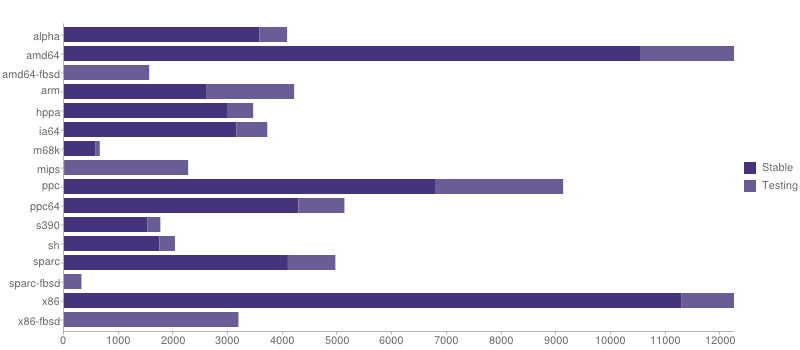
Infrastructure
The Gentoo Foundation recently received a donation of services from Rackspace. We would like to thank Rackspace for their donation and for continuing to support Open Source and Free Software Projects.

Security
The following GLSAs have been released by the Security Team
[table tablesorter=”1″ id=”glsas”]
GLSA, Package, Description, Bug
201402-27, x11-plugins/pidgin-knotify, pidgin-knotify: Arbitrary code execution, 336916
201402-26, net-libs/libssh, libssh: Arbitrary code execution, 444147
201402-25, dev-libs/openssl, OpenSSL: Denial of Service, 497838
201402-24, app-crypt/gnupg, GnuPG: Multiple vulnerabilities, 449546
201402-23, x11-libs/libXfont, libXfont: Multiple vulnerabilities, 378797
201402-22, net-analyzer/tcptrack, TCPTrack: Arbitrary code execution, 377917
201402-21, media-libs/tiff, libTIFF: Multiple vulnerabilities, 440154
201402-20, net-irc/kvirc, KVIrc: Multiple vulnerabilities, 326149
201402-19, dev-libs/libtar, libtar: Arbitraty code execution, 487420
201402-18, app-misc/mc, GNU Midnight Commander: User-assisted execution of arbitrary code, 436518
201402-17, app-text/xpdf, Xpdf: User-assisted execution of arbitrary code, 386271
201402-16, media-libs/freetype, FreeType: Multiple vulnerabilities, 448550
201402-15, mail-client/roundcube, Roundcube: Arbitrary code execution, 488954
201402-14, dev-libs/icu, International Components for Unicode: Denial of Service, 460426
201402-13, app-text/djvu, DjVu: User-assisted execution of arbitrary code, 497088
201402-12, sys-auth/pam_skey, PAM S/Key: Information disclosure, 482588
201402-11, www-client/links, Links: Denial of Service, 493138
201402-10, media-sound/pulseaudio, PulseAudio: Insecure temporary file usage, 313329
201402-09, www-apache/mod_fcgid, Apache mod_fcgid: Arbitrary code execution, 487314
201402-08, net-misc/stunnel, stunnel: Arbitrary code execution, 460278
201402-07, games-strategy/freeciv, Freeciv: User-assisted execution of arbitrary code, 329949
201402-06, www-plugins/adobe-flash, Adobe Flash Player: Multiple vulnerabilities, 491148
201402-05, media-sound/banshee, Banshee: Arbitrary code execution, 345567
201402-04, dev-perl/libwww-perl, libwww-perl: Multiple vulnerabilities, 329943
201402-03, x11-libs/pixman, Pixman: User-assisted execution of arbitrary code, 493292
201402-02, x11-drivers/nvidia-drivers, NVIDIA Drivers: Privilege Escalation, 493448
201402-01, net-libs/libmicrohttpd, GNU libmicrohttpd: Multiple vulnerabilities, 493450
[/table]
Package Removals/Additions
Removals
[table]
Package, Developer, Date
dev-php/PEAR-HTML_BBCodeParser, mabi, 13 Feb 2014
dev-php/PEAR-HTML_QuickForm_ElementGrid, mabi, 13 Feb 2014
dev-php/PEAR-HTTP_Upload, mabi, 13 Feb 2014
dev-php/PEAR-HTTP_WebDAV_Server, mabi, 13 Feb 2014
dev-php/PEAR-Tree, mabi, 13 Feb 2014
dev-php/PHPUnit_Selenium, mabi, 13 Feb 2014
dev-php/PHPUnit_MockObject, mabi, 13 Feb 2014
media-plugins/vdr-xxvautotimer, hd_brummy, 14 Feb 2014
media-plugins/vdr-skinclassic, hd_brummy, 14 Feb 2014
media-plugins/vdr-sky, hd_brummy, 14 Feb 2014
media-plugins/vdr-skinreel, hd_brummy, 14 Feb 2014
net-misc/usbip, ssuominen, 18 Feb 2014
[/table]
Additions
[table]
Package, Developer, Date
app-crypt/ssdeep, radhermit, 01 Feb 2014
sec-policy/selinux-couchdb, swift, 02 Feb 2014
app-text/bdf2psf, floppym, 10 Feb 2014
dev-python/llvmpy, bicatali, 10 Feb 2014
dev-python/numba, bicatali, 10 Feb 2014
dev-python/blz, bicatali, 10 Feb 2014
dev-python/datashape, bicatali, 10 Feb 2014
dev-libs/libdynd, bicatali, 10 Feb 2014
dev-python/dynd-python, bicatali, 11 Feb 2014
dev-python/llvmmath, bicatali, 11 Feb 2014
dev-python/pykit, bicatali, 11 Feb 2014
dev-python/blaze, bicatali, 11 Feb 2014
dev-util/squashdelta, mgorny, 11 Feb 2014
dev-util/squashmerge, mgorny, 11 Feb 2014
dev-python/astroid, idella4, 12 Feb 2014
net-im/birdie, jlec, 12 Feb 2014
media-libs/libomxil-bellagio, chithanh, 12 Feb 2014
dev-ruby/instantiator, graaff, 13 Feb 2014
dev-ruby/introspection, graaff, 13 Feb 2014
dev-ruby/multi_test, graaff, 13 Feb 2014
app-emacs/redo+, ulm, 13 Feb 2014
sys-apps/install-xattr, blueness, 13 Feb 2014
dev-python/astor, patrick, 14 Feb 2014
dev-lang/hy, patrick, 14 Feb 2014
sys-block/kvpm, kensington, 14 Feb 2014
app-misc/mediacrush-cli, maksbotan, 17 Feb 2014
sec-policy/selinux-pcscd, swift, 17 Feb 2014
dev-vcs/git-crypt, patrick, 18 Feb 2014
app-emacs/mediawiki, ulm, 18 Feb 2014
dev-python/repoze-sphinx-autointerface, radhermit, 19 Feb 2014
dev-python/kazoo, radhermit, 19 Feb 2014
kde-misc/kdeconnect, mrueg, 20 Feb 2014
net-news/canto-daemon, pinkbyte, 20 Feb 2014
net-news/canto-curses, pinkbyte, 20 Feb 2014
dev-ruby/http_parser_rb, graaff, 21 Feb 2014
dev-ruby/http, graaff, 21 Feb 2014
dev-python/keyczar, radhermit, 22 Feb 2014
app-emacs/hexrgb, ulm, 23 Feb 2014
dev-python/scoop, slis, 23 Feb 2014
[/table]
Bugzilla
The Gentoo community uses Bugzilla to record and track bugs, notifications, suggestions and other interactions with the development team.
Activity
The following tables and charts summarize the activity on Bugzilla between 27 January 2014 and 26 February 2014. Not fixed means bugs that were resolved as NEEDINFO, WONTFIX, CANTFIX, INVALID or UPSTREAM.
[table]
Bug Activity, Number
New, 1583
Closed, 1051
Not fixed, 227
Duplicates, 171
Total, 5480
Blocker, 4
Critical, 17
Major, 67
[/table]
Closed bug ranking
The developers and teams who have closed the most bugs during this period are as follows.
[table]
Rank, Team/Developer, Bug Count
1, Gentoo Security, 105
2, Gentoo Linux Gnome Desktop Team, 63
3, Perl Devs @ Gentoo, 37
4, Robin Johnson, 34
5, Gentoo KDE team, 28
6, Gentoo X packagers, 25
7, Gentoo Sound Team, 25
8, Python Gentoo Team, 21
9, Bernard Cafarelli, 20
10, Others, 692
[/table]
Assigned bug ranking
The developers and teams who have been assigned the most bugs during this period are as follows.
[table]
Rank, Team/Developer, Bug Count
1, Gentoo Linux bug wranglers, 104
2, Gentoo Security, 88
3, Gentoo Linux Gnome Desktop Team, 73
4, Gentoo KDE team, 37
5, Gentoo’s Team for Core System packages, 35
6, Default Assignee for New Packages, 34
7, Java team, 34
8, Portage team, 34
9, Default Assignee for Orphaned Packages, 32
10, Others, 1111
[/table]
Tip of the month
Are you using a packages that needs a maintainer?
To find out use this python script developed by Ewoud Kohl Van Wijngaarden and Chris Stout. The script requires dev-python/beautifulsoup. Users can become maintainers for packages via the proxy-maintainer process.
Heard in the community
Problem installing net-libs/webkit-gtk:* hangs (gobject-introspection problem?) with =x11-drivers/nvidia-drivers-325.*
If you are using the nvidia proprietary driver, you may encounter a g-ir-failure as emerge will hang.
See BUG 463960
There is also a forum post about this.
Work around is:
# eselect opengl set xorg-x11
# emerge -1 webkit-gtk
# eselect opengl set nvidia
Want to emerge (update) all installed packages which depend on some given package P?
eix --deps -# -I P
That will list all packages in short that are installed and have P in their dependency variables plus the package itself.
Thanks go to gentoo-user@lists.gentoo.org for that 🙂
What do you do if you encounter a bug and it may have already been fixed. Search on bugzilla with this to show all the bugs even if they have been fixed and closed?
ALL category/package

